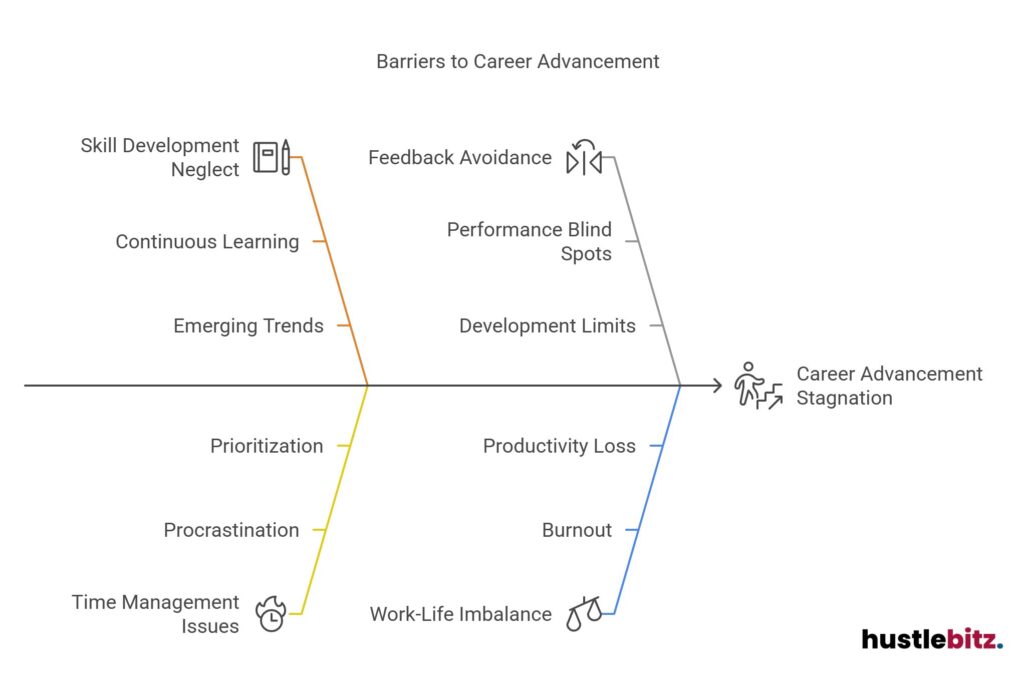Career advancement plans often encounter pitfalls that can hinder progress. A key mistake is underestimating the importance of skill development, which is vital for staying competitive. Mismanaging time and priorities can lead to procrastination, causing professionals to overlook essential tasks. Additionally, failing to seek feedback can result in a lack of growth, as constructive criticism is crucial for improvement. Neglecting work-life balance leads to burnout, reducing overall productivity. Finally, complacency in one’s current role stifles ambition and growth opportunities. Awareness of these common pitfalls can significantly enhance career strategies moving forward. More insights await to explore effective solutions.
Key Takeaways
- Underestimating the importance of continuous skill development can hinder career progression and limit advancement opportunities.
- Mismanaging time and priorities through procrastination leads to neglected tasks and missed career growth opportunities.
- Failing to seek feedback prevents individuals from recognizing performance blind spots and limits personal and professional development.
- Neglecting work-life balance can result in burnout, decreasing overall productivity and job satisfaction.
- Being complacent in a current role stifles growth and prevents individuals from identifying emerging trends and in-demand skills.

1. Underestimating Skill Development

How can professionals expect to advance in their careers if they underestimate the crucial role of skill development? In today’s dynamic work environment, the presence of skill gaps can hinder career progression and limit opportunities for advancement. Embracing continuous learning is essential, as it allows professionals to adapt to evolving industry trends and maintain relevance in their fields.
Engaging in online courses and certification programs offers a structured approach to skill enhancement. These resources provide targeted knowledge that can bridge existing skill gaps and boost employability. Additionally, professionals should actively seek mentorship opportunities, as experienced mentors can offer invaluable insights and guidance on skill development tailored to specific career goals.
Networking strategies also play a vital role in career advancement. By connecting with industry peers, professionals can exchange knowledge and discover new learning resources. Furthermore, personal branding is critical; showcasing transferable skills and newly acquired competencies can enhance one’s professional image and attract potential employers.
Resilience training should not be overlooked, as it equips individuals with the ability to navigate setbacks and challenges in their careers. By fostering a growth mindset and committing to continuous skill development, professionals can effectively position themselves for success.
Ultimately, the integration of these elements into a comprehensive career advancement plan is essential for overcoming obstacles and achieving long-term professional growth.
2. Mismanaging Time and Priorities
Effectively managing time and prioritizing tasks are critical components of a successful career advancement plan, as mismanagement in these areas can lead to missed opportunities and stalled professional growth.
Individuals often fall into procrastination pitfalls, neglecting essential tasks while allowing less important activities to consume their time. To combat this, it is crucial to adopt strategic time management practices, including:
- Goal Setting: Clearly define both short-term and long-term objectives. This will help in directing focus and ensuring that daily tasks align with broader career aspirations.
- Effective Scheduling: Utilize tools that promote effective scheduling, such as digital calendars or task management apps. By allocating specific time blocks for high-priority tasks, distractions can be minimized, enhancing productivity.
- Task Delegation: Recognize when to delegate tasks to others, which can free up time for critical responsibilities. Effective decision-making in this area can lead to better results across the board.
Additionally, priority shifting can be detrimental if not approached thoughtfully. Regularly reassess your priorities to adapt to changing circumstances and maintain momentum.
Incorporating focus strategies, like the Pomodoro Technique, can further enhance time allocation, ensuring that work sessions are productive. By developing a structured approach to time management, professionals can navigate their career paths more effectively, ultimately fostering growth and achieving desired outcomes.
3. Failing to Seek Feedback

Seeking feedback is an essential element of career advancement, as it provides valuable insights that can guide personal and professional development. Failing to actively seek feedback can result in missed opportunities for growth and improvement. Implementing effective feedback loops, which involve regular communication between peers and supervisors, fosters an environment conducive to learning and development.
Constructive criticism plays a critical role in this process. Engaging in peer reviews and soliciting mentor insights can illuminate blind spots in performance and highlight areas needing attention. Performance evaluations, when approached with openness, can serve as a roadmap for future achievements. Utilizing self-assessment tools can also empower individuals to reflect on their strengths and weaknesses, aligning their self-perception with external feedback.
Strong communication skills are pivotal in establishing open dialogues with colleagues and mentors. By cultivating a culture of candid discussions, professionals can create space for honest feedback, which is essential for refining action plans tailored to career goals.
Career coaching can further enhance this process, providing structured opportunities for individuals to receive and act upon feedback in a supportive environment.
4. Neglecting Work-Life Balance
Neglecting work-life balance can significantly hinder career advancement, as it often leads to burnout and decreased productivity. In today’s fast-paced environment, professionals may feel pressured to prioritize work over personal well-being. However, achieving effective work-life integration is crucial for long-term success. Establishing personal boundaries, practicing stress management techniques, and prioritizing mental health can enhance both professional growth and personal satisfaction.
To foster a healthy work-life balance, consider implementing the following strategies:
- Flexible Scheduling: Utilize flexible work arrangements, such as remote work options, to accommodate personal commitments while maintaining productivity.
- Self-Care Routines: Develop self-care routines that include leisure activities, exercise, and relaxation techniques to recharge physically and mentally.
- Family Support: Engage with family members and seek their support in managing responsibilities, thereby creating a collaborative environment that nurtures both career and personal life.
Incorporating these practices can lead to improved mental health, greater job satisfaction, and enhanced productivity. Additionally, employing productivity hacks can streamline work processes, allowing for more time dedicated to personal pursuits.
Ultimately, a balanced approach not only benefits individual well-being but also cultivates a more engaged and motivated workforce, which is essential for career advancement. By prioritizing work-life balance, professionals can navigate their careers more effectively, ensuring that they thrive both at work and at home.
5. Being Complacent in Current Role

Complacency in one’s current role can significantly impede career advancement, as it often leads to stagnation and missed opportunities for growth. Recognizing career stagnation signs, such as a lack of new responsibilities or decreasing enthusiasm, is vital for maintaining a trajectory toward success.
Professionals must engage in regular promotion readiness assessments to gauge their preparedness for advancement, ensuring they remain competitive in an ever-evolving job market.
Adopting a professional growth mindset is essential. This involves actively seeking networking opportunities to connect with industry leaders and peers, thereby expanding one’s professional circle. Additionally, cultivating job market awareness enables individuals to identify emerging trends and skills that are in demand.
Self-assessment techniques can help professionals evaluate their competencies and areas for improvement, facilitating targeted development efforts.
The importance of mentorship cannot be understated; mentors provide invaluable guidance and insights that can accelerate career progression. Engaging in industry trend analysis allows professionals to stay informed about shifts that may influence their career paths.
Implementing goal-setting strategies can further clarify aspirations and motivate individuals to take actionable steps toward their objectives.
Final Thoughts
Understanding and avoiding common mistakes in career advancement plans can significantly impact your professional growth and success. By prioritizing continuous skill development, managing your time effectively, actively seeking feedback, maintaining a healthy work-life balance, and avoiding complacency, you can create a robust and dynamic career strategy. These proactive steps not only help you stay competitive in your field but also ensure that you are consistently moving towards your career goals with purpose and resilience. Embrace these insights to refine your career plan and unlock your full potential.




